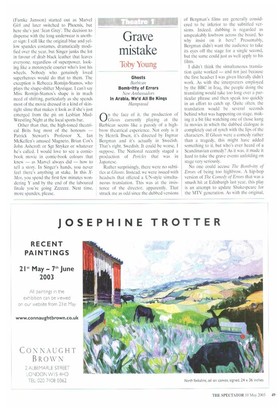Grave mistake
Toby Young
Ghosts Barbican Bomb-itty of Errors
\c11...linbarsarfors
In Arabia, We'd All Be Kings Hampstead
Qn the face of it, the production of Ghosts currently playing at the Barbican seems like a parody of a highbrow theatrical experience. Not only is it by Henrik Ibsen, it's directed by Ingmar Bergman and it's actually in Swedish. That's right, Swedish. It could he worse, I suppose. The National recently staged a production of Pericles that was in Japanese.
Rather surprisingly, there were no subtitles at Ghosts. Instead, we were issued with headsets that offered a UN-style simultaneous translation. This was at the insistence of the director, apparently. That struck me as odd since the dubbed versions of Bergman's films are generally considered to he inferior to the subtitled versions. Indeed, dubbing is regarded as unspeakably lowbrow across the board. So why insist on it here? Presumably, Bergman didn't want the audience to take its eyes off the stage for a single second, but the same could just as well apply to his films.
I didn't think the simultaneous translation quite worked — and not just because the first headset I was given literally didn't work. As with the interpreters employed by the BBC in Iraq, the people doing the translating would take too long over a particular phrase and then speak too quickly in an effort to catch up. Quite often, the translation would be several seconds behind what was happening on stage, making it a bit like watching one of those kung fu movies in which the dubbed dialogue is completely out of synch with the lips of the characters. If Ghosts were a comedy rather than a tragedy, this might have added something to it, but who's ever heard of a Scandinavian comedy? As it was, it made it hard to take the grave events unfolding on stage very seriously.
No one could accuse The Bomb-itty of Errors of being too highbrow. A hip-hop version of The Comedy of Errors that was a smash hit at Edinburgh last year. this play is an attempt to update Shakespeare for the MTV generation. As with the original,
the plot centres on two sets of twins who are separated at birth, only in this version they're put up for adoption when their father is arrested for drug dealing. The action takes place in the ghetto of a contemporary American city and the story is told entirely in rhyming couplets against the backdrop of a loud, hip-hop beat. It's like listening to a rap song that goes on for two hours and 15 minutes, except that you can actually hear the words.
Attempts to make Shakespeare 'relevant', whether by sticking the characters in contemporary costumes or modernising the text, are usually pretty ghastly. hut The Bomb-itty of Errors is surprisingly charming. You can't help admiring how ingeniously the writers have adapted the original and it's full of deft little touches, such as the inclusion of real lines of Shakespearean dialogue. Four male actors manage to play all the parts, a feat that requires an impressive expenditure of energy, and one of them, an actor called Ranney, is a genuinely gifted performer.
In the end, though, it becomes a little monotonous. The play never transcends the limitations of hip-hop as a narrative medium. No real attempt has been made to dramatise the story; instead, the different characters simply take it in turns to tell it. At first, this is divertingly novel, but after 15 minutes or so you begin to long for the introduction of some alternative story-telling device. It's a bit like an episode of classic Trek in which the Captain's log goes on for 60 minutes. Or, rather, 135 minutes.
In Arabia We'd All Be Kings is an early work by Stephen Adly Guirgis, the American playwright responsible for Jesus Hopped the A-Train, one of the high points of last year. It's not nearly as accomplished as that, but it's a compelling piece of theatre nevertheless. Set in Hell's Kitchen in the mid-to-late Nineties, it charts the spiralling descent of a group of alcoholics, prostitutes and crack addicts who congregate in what might laughably be described as a 'neighbourhood bar'.
As someone who actually lived in Hell's Kitchen in the mid-to-late Nineties, and quite often washed up in bars like this, I can tell you that these characters are completely unrealistic. They're low lifes as imagined by a middle-class performingarts graduate, trapped in circumstances beyond their control, struggling to better themselves, and being pulled back down by cruel fate. What Stephen Adly Guirgis fails to capture is the joyful irresponsibility of the denizens of Hell's Kitchen. Quite often, the reason we were all in a bar at four a.m., instead of at home in bed, wasn't because we were unemployed, It was because the act of throwing our lives away filled us with a sense of reckless freedom. Vice isn't simply the curse of the underclass that this puritanical playwright seems to imagine. It can also be an enormous amount of fun.



































































 Previous page
Previous page